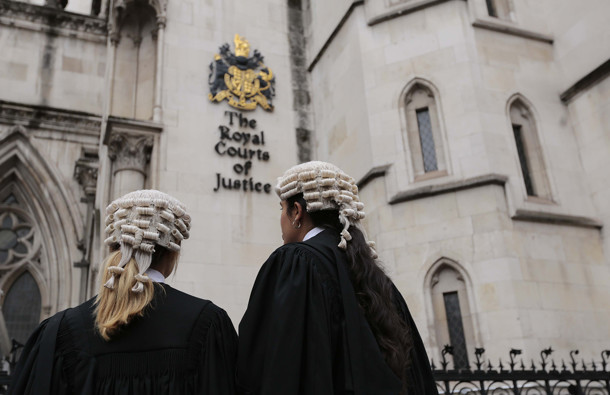Nature vs Nurture: How biodiversity losses could threaten the global economy, the strategies being used to tackle this prospect, and why we could stand to lose either way
June 29, 2023
Breaking Barriers: Omar Negm’s Journey to Legal Success
June 30, 2023In this article, Elfie Farrant interviews a future Pupil Barrister, Julius Klutse.
Would you like to start by briefly sharing your background and journey into law?
Hi, my name is Julius, and I am a Senior Paralegal at Overdales Solicitors and a Future Pupil Barrister at Exchange Chambers (commercial pupillage). I was born and grew up in Germany, and I lived there for about 10 years. When I moved to the UK, I didn’t know much English, so I was placed in the bottom sets at school. I was, however, very interested in athletics, and that gave me a great work ethic that enabled me to move up into the top sets by the time I was sitting my GCSEs. At around that time, my school invited some pupils to a university activity day in relation to law. We had to analyse a case problem and present it to the professors. They were impressed with my findings and recommended that I should pursue a career as a barrister, and I haven’t looked back since. Next year, when I start my pupillage in March, it will have been exactly ten years since I made that decision.
What persuaded you to become a barrister, instead of a solicitor?
It was really my experiences at university that crystallised my goal in pursuing a career at the bar. It is a mixture of doing mooting competitions, as well as participating in mini pupillages. With mooting, I found the process of undertaking research in complex areas of law and presenting my conclusions to a judge really rewarding, especially when you win some of those moots! The minis also allow you to undertake research for the barrister that you are shadowing. In one of the commercial mini pupillages, I was tasked to do a research note on an area of law that I was unfamiliar with, and I loved getting into the nitty-gritty of the law and the facts. The barrister I shadowed adopted my research note in the pleadings in the arbitration dispute, and I got a great sense of satisfaction from that. The solicitor route was never really on the table for me because I was fully emersed in working towards a career at the bar.
You have completed a variety of mini pupillages; what were you able to learn from these?
I initially completed mini pupillages at sets of chambers with broad practice areas ranging from crime, personal injury, clinical negligence, and other civil matters. But I increasingly only applied to commercial sets, with the view to obtaining a commercial pupillage. What I learned from these is that life at the commercial bar is heavily paper based. You will mainly be drafting skeleton arguments, pleadings, and opinions. Solving a problem using the law is something I find fulfilling, which is why I’m particularly drawn to commercial law. However, written advocacy isn’t the be all and end all of the commercial bar. I have also had the chance to observe CCMCs and appellate advocacy in some commercial mini pupillages.
Also, at one of my earlier criminal mini pupillages, I’ve had the opportunity to observe good and bad advocacy. I attended a sentencing hearing, and when prosecuting counsel stood up, he read off a sheet of paper, was not engaging with the judge, was speaking sotto voce, and he didn’t grab my attention. When defence counsel stood up, he was the exact opposite. He maintained eye contact with the judge, was engaging with the tribunal, and his submissions were audible. That taught me the difference between ‘good’ and ‘bad’ advocacy and how oral submissions can make a difference to the outcome of a hearing, given that the Defendant was charged with over 20 counts of theft offences!
How do you think working as a paralegal has shaped your experience in law?
In my current role as a Senior Paralegal, I undertake civil cases, predominantly breach of contract claims for Claimants. I find that at the firm I am with now, I have broad autonomous decision-making authority over the cases I handle. Recently, I have negotiated with the Defendant and attempted to settle the matter. The Defendant was initially adamant in arguing his limitation defence, but I was able to persuade him to resolve the dispute out of court a few days before the hearing was due to commence! Therefore, my experience hasn’t just tested my legal skills, such as drafting or making oral and written submissions. It also tested my alternative dispute resolution skills, and that is not something you learn in bar school.
What advice would you give to aspiring barristers, and students planning on undertaking the Bar Course?
I should preface by saying that I did the bar course part-time and worked full-time as a paralegal alongside it, which I would recommend. Most people do work on the side anyway. Even if you have been fortunate enough to have obtained a scholarship, I would still recommend that you paralegal or undertake other legal work on the part-time course.
The first piece of advice I would give is to participate in mooting because you will develop your legal research and analytical skills. I found that my experience has helped me with the civil advocacy part of the bar course. It was just like mooting but slightly easier! It was so familiar to me, and I could see my skills improving. If you have already done mooting, it will help you a lot. Debating can also help.
Secondly, I would advise aspiring barristers to do the qualifying sessions before they start the course. I had done more than half of my required qualifying sessions before I started, and in the end, it was something less that I had to worry about during the bar course.
Thirdly, I would advise prospective students to make complete notes on the set syllabus reading because time does fly and when revision comes you will be thankful that you made good notes. Further, in relation to revision, I would advise students to read the White Book carefully and therefore CPR and the commentary in it, because in the exam (multi-choice) they will copy and paste the exact text from the book, and the difference between the right and wrong answer may be one word. I would also recommend students check out Taz Aldeek. He has a YouTube channel, is on social media, and has a website. He produces content about all things bar related.
Fourthly, my advice for undergraduates or GDL students is to get involved with everything that is on offer at your university’s law society. Relish all the opportunities that are available now and continue to take them over the years to build your experience. By the time you submit pupillage applications during your final year of study or the bar course, you will not have to worry too much about acquiring relevant experience because you will have accumulated most of them during your undergraduate years.
Lastly, get a mentor. My mentors were instrumental in me obtaining pupillage. They will be able to guide you towards your career at the bar, read your applications, and help you strengthen your CV. That’s probably the advice that I would recommend the most.





